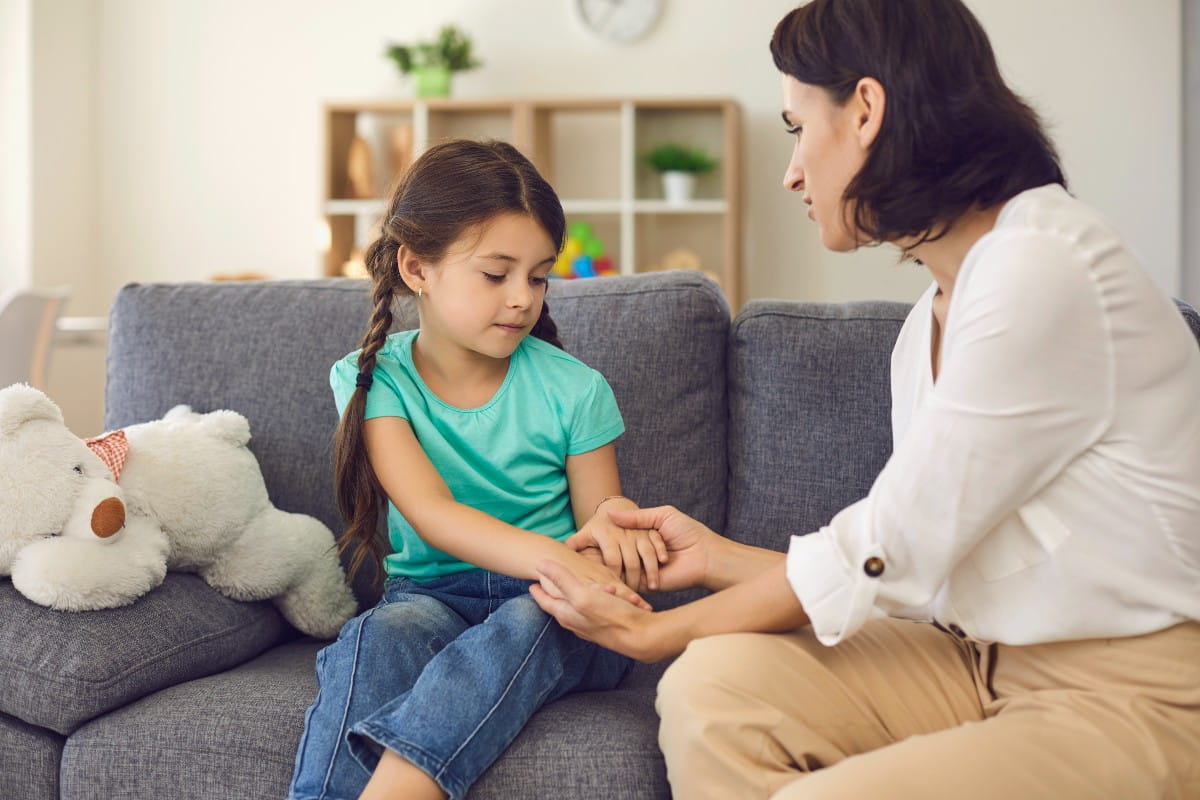Explaining a cancer diagnosis to a child is a conversation no parent ever wants to have. But there’s no avoiding the difficult discussion when a family member is diagnosed with the disease. Most of the time, honesty is better than shielding your kids from the truth.
There’s no perfect formula for talking to kids about cancer, but there are ways to make the conversation more manageable for everyone involved. In this article, we share advice from our Riverside Mental Health and Recovery Center team on talking to kids about a serious illness. We’ll cover age-appropriate strategies for discussing heavy topics in a way that supports their emotional and mental well-being.
Understanding the impact of cancer on families
Nearly two million people are diagnosed with cancer annually. It’s a disease that doesn’t discriminate — people of all ages, races and socioeconomic backgrounds can get sick.
When a parent gets cancer, it affects the entire family. For some time, your lives may feel centered around the disease as doctor’s appointments and treatments become the focus. As your family adapts to a new normal, it’s important to communicate and find ways to maintain a sense of routine.
Recognizing emotional responses in children
The way kids respond emotionally to a family member’s illness varies based on their personalities and age. For example, younger children may display behavioral changes because they don’t have the language to express stress, while teens may be more vocal.
Depending on their ages, signs of a child’s response to stress may include:
- Anxiety and worry
- Headaches
- Reduced appetite
- Bedwetting
- Nightmares
- Emotional outbursts
- Aggressive or stubborn behavior
- Clingy behavior (not wanting their parent out of their sight)
- Becoming withdrawn or dejected
Be patient with your child as they adapt to the changes of an illness. Encourage them to share their feelings with you or someone else if they're acting differently.
Maintaining honest communication
When you’re navigating a cancer journey, try to create an environment where your kids feel comfortable asking questions and expressing their emotions. They’re managing many changes with you — and they may be feeling the same worries or frustrations as you.
How much you share about your diagnosis and treatment plan is your choice. Make it a goal to balance being truthful about the disease and being sensitive to their young minds.
Age-appropriate strategies for discussing cancer
Infants and toddlers (0-2 Years)
- Explain a medical diagnosis in the simplest terms possible and avoid details.
- Consider saying, “Mommy has to go to the doctor to get the boo-boo removed.”
- Maintain a routine that makes them feel safe and secure.
- Provide physical comfort and affection often.
Preschoolers (3-5 Years)
- Keep explanations simple, concrete and consistent.
- Avoid medical jargon.
- Reassure them about any fears or misconceptions about your illness.
- Engage your child in play when talking about a diagnosis.
- Let your child ask questions to drive the conversation when talking about cancer.
- Consider saying, “Tell me what you know about cancer.”
- Provide information in a way that’s not overwhelming.
- Draw on their strengths to help out around the house and with your care.
- Remind your child they’re not responsible for your illness.
- Reassure they can’t catch cancer from someone.
Teenagers
- Involve your teenager in your care as much as they’re comfortable.
- Allow them to ask the doctor questions about your diagnosis.
- Respect their privacy when processing the situation.
- Give them an expressive outlet, like sports or art.
- Connect them with peer support groups or counselors.
Navigating treatment and changes together
If your world feels like it’s been turned upside down, know that it’s only temporary. Your family, community and healthcare team will help you get through the cancer journey — while keeping your family life as normal as possible along the way.
Below are tips for maintaining a sense of normalcy in your home as you begin treatment.
- Keep the kids on a routine. A regular schedule gives kids a sense of security. Rely on friends and family to help get your kids to school and activities.
- Involve kids in your care. If your child shows interest in your illness, allow them to participate in your care. Having a job allows kids to feel useful and empowered.
- Seek community or online resources. There are many resources for families like support groups, counseling and educational materials. Click here for local resources.
Preparing for the road ahead
Everyone’s cancer journey is different — and treatment depends on your diagnosis type and stage. Treatment may involve surgery, chemo, radiation or other medical therapies.
The goal of cancer treatment is to get your health in the best shape possible so you can be present for the people in your life. As you begin taking steps forward, consider these tips for preparing your family for upcoming challenges.
- Have ongoing conversations. Remember to have regular check-ins and updates with your family. Adapt the discussion as treatment progresses.
- Seek additional help when needed. It’s appropriate to seek professional support when your kids are having trouble coping with your illness. Reach out to health care professionals like pediatricians, oncology nurse navigators and primary care providers for additional help.
Navigating a cancer diagnosis is hard enough, but talking to kids about cancer brings a new set of challenges. However, your kids respond, remember that being straightforward is one of the best ways to support them.
You’re not alone on your cancer journey. Connect with your team of health care professionals to learn how they can support you and your family in your illness.



